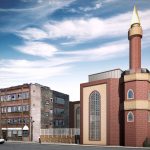Our Projects

The new project at Esha-Atul Islam is set to significantly broaden the beneficiaries of the Institute. In light of atrocities occurring around the world, refugees will now also benefit from the centre, along with improvements in services reaching out to women, youth, the unemployed and girls.
This increase in beneficiaries will be a direct result of increased facilities, space and resources. Therefore, it is only through the proposed expansion that all of these people will be able to benefit.
One of the main focuses of the plan is for Esha-Atul Islam to capitalise on its close relations with TELCO and London Citizens, reinforcing the positive work that we are conducting alongside them, in order to generate further projects promoting a civil society.
Esha-Atul Islam will teach, preach and promote values, such as respecting the environment and neighbours. As a result of this, the centre will do its maximum to ensure that the local area is not disturbed in any way. As the new project will produce a larger centre, people will be able to congregate within our four walls, thus reducing noise pollution in the public domain.
In terms of comparisons to other similar projects that have taken place in the past, the vast improvements to the locality of such projects are becoming increasingly evident. One such example is the case of the London Muslim Centre near Whitechapel Road in Tower Hamlets. Since the completion of the development, the immediate area surrounding the centre has completely regenerated, becoming more vibrant and safe. As a result, the area has attracted more people and businesses, luxury apartments have been built nearby and the local economy has improved drastically.
At the moment, the area surrounding Esha-Atul Islam is not appealing, with a number of businesses closing down. With the Royal London Hospital and Whitechapel Station nearby, thousands of people are walking through the locality every day. This means that the Esha-Atul Islam expansion will capitalise on the area’s potential, replicating the same impact as the London Muslim Centre.
Women’s services
The new project will allow Esha-Atul Islam to become the heart of the community. One of the demographics that the new development will target is women. In the community of Tower Hamlets, the amount of women who are actively searching for ways to increase their involvement in society is extremely high. At the moment, however, the current facilities at Esha-Atul Islam simply cannot accommodate the large number of females aspiring to get involved. Demand for women’s’ services is high, moreover as they represent half of the community, and are often considered to be managers of every household, Esha-Atul Islam believes that women ought to be of elevated priority, consequently, the new development will include an array of female-oriented programs, services and dedicated space.
One of the main services Esha-Atul Islam provides to the community is the London Islamic School (LIS), a full time independent secondary school for boys. Housed within the Esha-Atul Islam complex, the school boasts an extremely successful history. This huge success was manifested in recent Ofsted inspections, where the London Islamic School was judged as being a good school. The significance of this is leveraged further, as the majority of faith-based schools and even some state schools in the locality where going through rigorous and intense inspection and unfortunately did not meet Ofsted standards. This emphasises London Islamic School’s distinction, its quality and its drive to be an institution of educational excellence.

Esha-Atul Islam is located in, and serves, on of the most deprived boroughs in the country. Tower Hamlets has recently been ranked the third poorest borough in the UK. As a result of this, many people are either unemployed or underemployed, which has adverse knock-on effects on their families’ quality of life. For many young people, the lack of employment forces them to resort to the streets, becoming involved in things such as petty crime and drug dealing. This is something, which through various youth projects, we have discovered to be stemming from the lack of opportunity.
The new Esha-Atul Islam institute will provide innovative projects, including workshops on how to prepare applications and refine CV’s. The facility will also promote the notion of entrepreneurship, fuelling both the unemployed and those who are employed with ambition and aspiration to broaden their minds and horizons to something bigger than being an employee. Esha-Atul Islam appreciates that those in search of employment only need the inspiration to drive them out of their comfort zones and towards a bright future. Therefore, there are also plans for collaborations with other colleges and universities to run classes, courses and careers advisory sessions.
Ultimately, if we enable people to find employment, or indeed launch their own business start-ups, the quality of their lives and those around them will improve significantly, offering a new lease of life with social integration, prevention from crime and contribution to the local economy.
Esha-Atul Islam’s most significant new offering after the redevelopment project will be the all-new interfaith library. Though there are various libraries in the locality containing sections of faith-based material, Esha-Atul Islam is set to boast the first library, dedicated exclusively to religion, in the entire country. The resource only library will house a wide and comprehensive specialist range of books, journals, articles, booklets and electronic resources covering all aspects of every faith. The aim of the library is to endorse a civil society, whereby people from all faiths and none can come along to learn, study, read and research. The library itself will also actively continue to play a part in supporting the movement towards a civil society by working with external bodies, such as churches, synagogues, temples, charities and educational institutes.
The library aspires to be an institution of public access on an open public domain, allowing the positive interfaith work to be recognised by everyone. One of the regular services that will take place as part of the interfaith library project is scriptural reasoning sessions. Members of all different faiths, including Muslims, Sikhs, Christians, Jews and Hindus will attend to collectively discuss and share their religious values and teachings. Each session, a topic concerning the entire community will be selected, such as the meaning of life, injustice, crime or the environment, and segments from each respective religious scripture will be extracted, presented and discussed.
This is a beautiful way to facilitate interfaith dialogue, allowing people to learn about one another’s faith in the context of issues on the common ground. These relevant discussions from a theological angle will also promote tolerance, respect and unity amongst the differing faiths.
As the interfaith library will focus on things that unite us rather than things that divide us, the community will develop strengthened ties and breed a sense of harmony. Thus, due to the impact this interfaith library will have on society at large, it will go down as a historical legacy.
